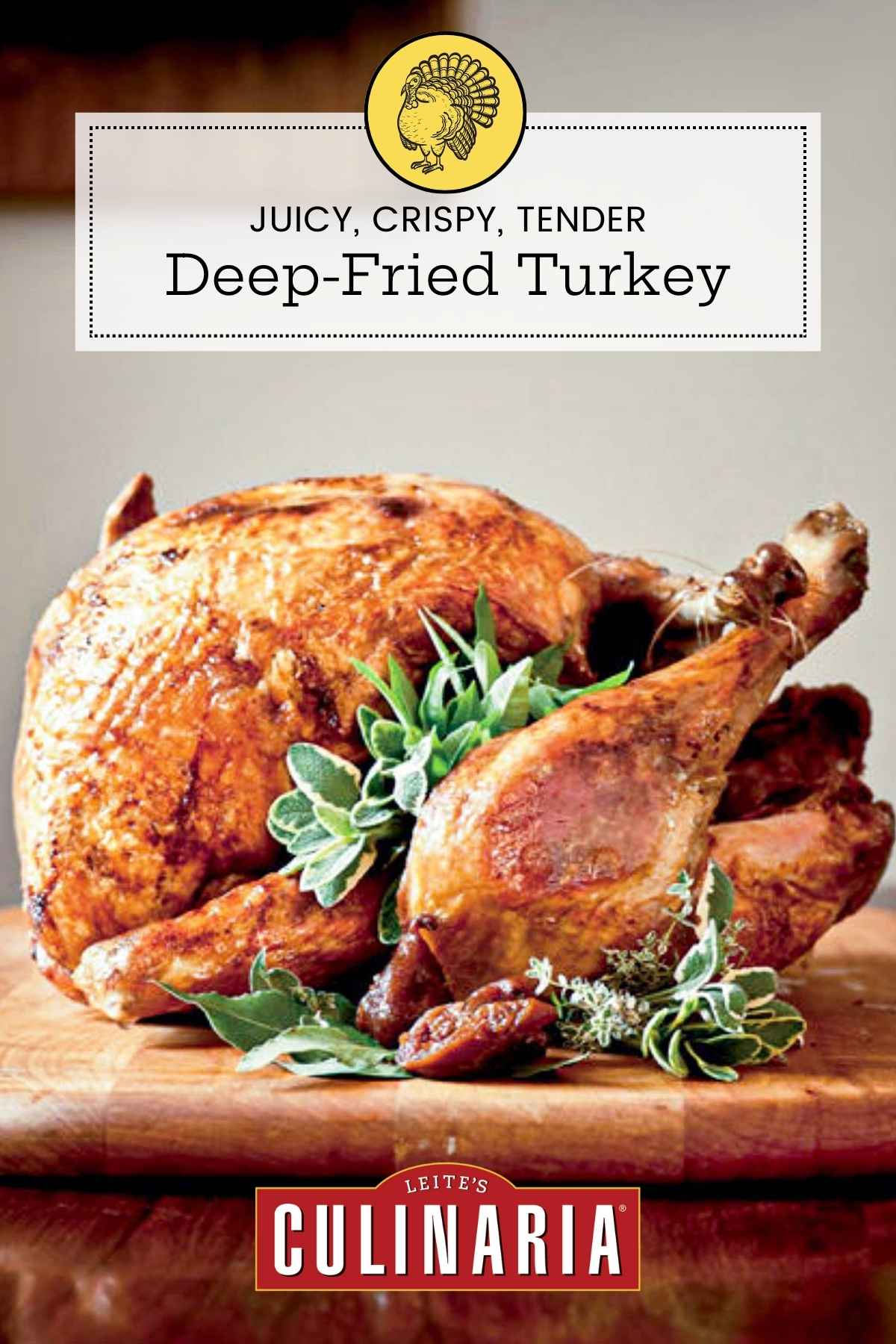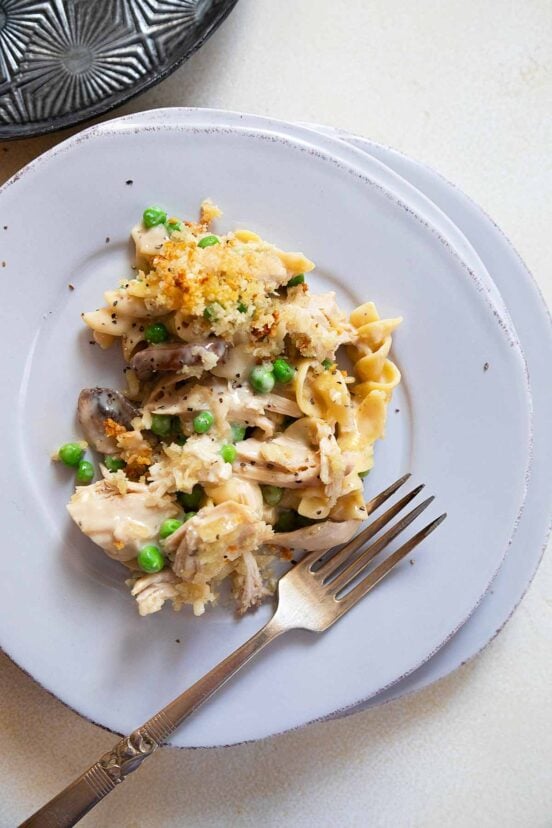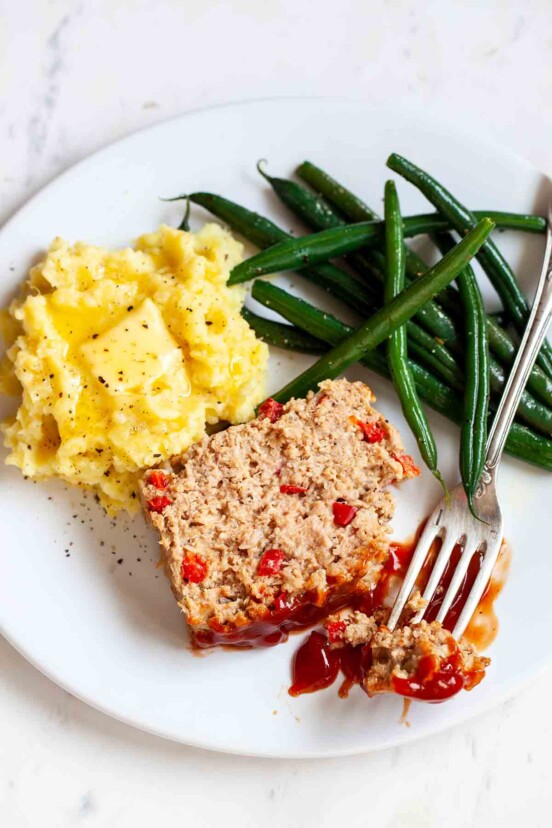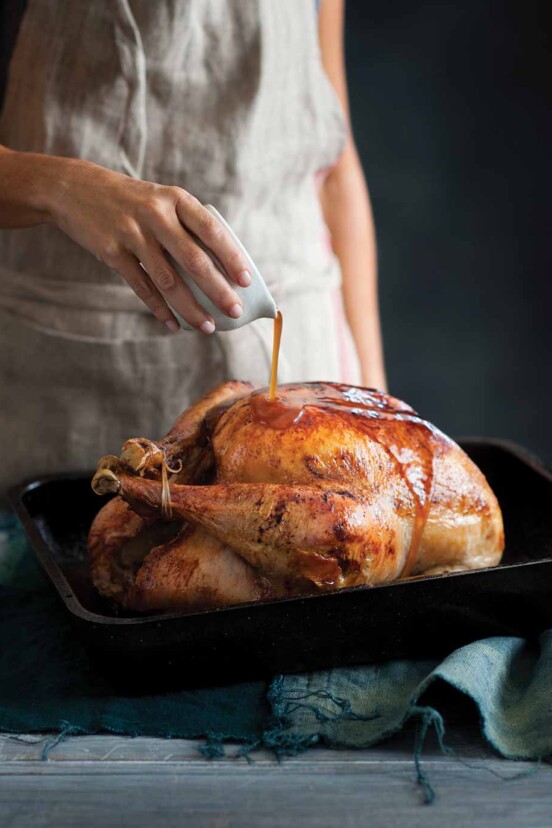
Want to save this?
TL;DR (Quick-Answer Box)
- What it is: A whole turkey, fried to yield unbelievably crisp, mahogany-colored skin and exceptionally moist, tender meat with a slight Cajun insistence.
- Why you’ll love it: It’s the fastest way to cook a whole turkey, resulting in a show-stopping Thanksgiving main course that frees up your oven for sides.
- How to make it: Dry the turkey completely, season it well, then carefully, carefully submerge it into preheated peanut oil and fry until an instant-read thermometer inserted in the thickest part of the thigh reads 170°F to 180°F (76°C to 82°C), which should take about 3 minutes per pound.

Featured Review
Very thorough guide and recipe. Best turkey I’ve ever had. Not oily at all, and the meat was incredibly juicy and tender. You can’t beat the color of the turkey when deep fried, either. One top tip to emphasize is to turn off the burner prior to lowering the turkey in AND lower very very slowly. Sometimes you may want to lower an inch and pull it back up just to get the bubbling to settle. Highly recommend.
Fryin’ Ryan
I’m just going to say it like it is. This deep-fried turkey is the best damn turkey most of us have ever had. You may have heard others brag about the burnished appearance, crackly skin, and impossibly tender, juicy-beyond-belief meat of a deep-fried turkey. It’s true. And a deep-fried turkey frees up your oven for all those side dishes (hello, potatoes Dauphinoise!)
Deep-frying a turkey has gotten something of a bad rep because, well, accidents happen. But there are precautions that can and must be taken, which make this a terrific way to enjoy the yearly bird. You’ll find them below the recipe. Heed them.
Before continuing, I urge you to read my extensive notes in the recipe. And, please, heed them.
More Mouth-Watering Turkey Recipes
Write a Review
If you make this recipe, or any dish on LC, consider leaving a review, a star rating, and your best photo in the comments below. I love hearing from you.–David

Deep-Fried Turkey
Video
Equipment
- Outdoor deep fryer
- Common sense (extra-large)
Ingredients
- One (12-pound) fresh turkey, (preferably fresh; if previously frozen, it must be COMPLETELY thawed)
- Sea salt and freshly ground black pepper
- 1 stick unsalted butter, room temperature (optional)
- 2 tablespoons ground cayenne pepper, (optional)
- 2 1/2 to 3 1/2 gallons peanut oil, (the amount of oil depends on the size of your fryer; better to err on the side of buying too much since you can always return any unused, unopened containers)
- Sprigs of fresh herbs, (sage, thyme, or bay) for garnish (optional)
- Dried figs, for garnish (optional)
Instructions
- Rinse the turkey inside and out and pat it completely dry with paper towels. We mean REALLY, REALLY dry. (The turkey must be dry beyond a doubt, inside and out. If you’re using a frozen hen, it must first be thoroughly defrosted with no trace of ice. Any droplets of water or chips of ice can cause spattering—or worse, much worse–during frying.) Discard the bag of giblets as well as any pop-up timers or other plastic paraphernalia found in your turkey.
- Trim the excess fat from around the turkey neck. Trim the tail. Fold the wings beneath the turkey as if it were lying on its back with its arms, er, wings tucked beneath its head. Truss the turkey if you like, though it’s not at all necessary.
- Season the turkey all over, inside and out, with salt and black pepper to taste. If desired, rub the turkey all over with the butter and, again if desired, sprinkle the turkey with the cayenne. (Do not, under any circumstances, consider stuffing the turkey.)
- Situate the fryer far from your house, garage, and any other buildings or overhangs. Pour enough oil in the turkey fryer to reach the fill line, which is usually found inside the fryer about halfway between the bottom and the top. Heat the oil to 350°F (176°C). It could take an hour or more to get the oil to the proper frying temperature.
- Don your apron, goggles, and gloves and have the fire extinguisher within reach. (Seriously.) Turn off the burner. Place the turkey in the fry basket and, holding the turkey away from you, slowly, slowly, slowly submerge the turkey in the hot oil. The oil will start to bubble. This is normal although at times you may need to lower the turkey an inch and then pull it back up and wait a little before lowering it again so the bubbling oil doesn’t come dangerously close to the top of the fryer. The oil temperature will drop, but don’t adjust the temperature just yet as it should bounce back relatively quickly.
- Turn the burner back on and fry the bird until it’s golden brown and an instant-read thermometer inserted in the thickest part of the thigh reads between 170°F and 180°F (76°C and 82°C). This should take about 3 minutes per pound (that’s 36 minutes for a 12-pounder). Start timing the bird as soon as you plunge it into its oil bath. Maintain the temperature of the oil as best you can at 350°F (176°C) but do not cover the fryer at any point and do not allow the oil to go above 360°F (182°C). And for the love of all things good, do not leave the fryer unattended. Ever.
- When the turkey is done, turn off the fryer. Line a rimmed baking sheet with brown paper bags and have someone hold it steady. Carefully, carefully, carefully lift the turkey from the fryer as if your life depended on it, because in a sense, it does. Pause, with the turkey hovering above the fryer, a few moments to allow any excess oil to drop back into the fryer. Carefully place the bird on the baking sheet. Place it on the counter, loosely cover with foil, and let it rest for at least 15 to 20 minutes. Let the oil cool completely in the fryer until after dinner.
- Carve and serve as soon as possible, before you snitch so many pieces of crisp, crackly skin that your guests become wise to you. Garnish, if you please, with sage leaves or sprigs of herbs and dried figs, cranberries, or whatever else you please. Behold!
- After dinner, when the oil is completely cool, pour or siphon it into empty resealable containers and dispose of it according to the rules in your city. (Don't know? Google it.)
Notes
*What You Need To Know About (Safely!) Making Your Deep-Fried Turkey
You’ll need a few things to make this deep-fried turkey, including the following items and insights:- An outdoor deep fryer, either gas or electric (check that it comes with a fry basket; you may need to purchase this separately)
- Long-sleeved fireproof gloves
- Heavy apron
- Safety goggles (in a pinch, a clear-bottomed plastic bowl will suffice)
- Shoes (um, something other than flip-flops; leather boots with steel toes do quite nicely)
- Stopwatch or kitchen timer some sort
- Instant-read thermometer (deep-fry or candy)
- Fire extinguisher (If you’ve never used one, read the directions; if, heaven forbid, you need to use an extinguisher, there’ll be no time to reach for your reading specs)
- A turkey that will easily fit in your fryer (preferably no more than 12 pounds).
Common sense

Explore More with AI
Nutrition
Nutrition information is automatically calculated, so should only be used as an approximation.
Recipe Testers’ Reviews
Did you know only 68% of the recipes we test make it onto the site? This recipe survived our rigorous blind testing process by multiple home cooks. It earned the Leite’s Culinaria stamp of approval—and the testers’ reviews below prove it.
Deep-frying a turkey is a unique experience. If you have the chance, visit someone who’s done it before, so you have the benefit of experience.
The finished turkey tasted as good as it looked! It had a clean flavor hinting of the deep-frying treatment, and a nicely browned and crisp skin.
There seems to be some fundamental differences between electric and gas fryers. It took close to 1 hour with my electric fryer to get the turkey cooked. There was very little splatter and no flare-ups.
I mixed equal portions of fresh ground black pepper and sea salt to season the turkey. I would suggest a minimum of one tablespoon, but if you start with two tablespoons, there should be plenty, with a bit left over.
The amount of cayenne had me concerned, but there really wasn’t much heat to the skin and definitely none in the meat. The white meat was just a tad on the dry side, but the dark meat was quite moist.
My thermometer registered between 160 and 180, depending on where I stuck it—difficult to gauge through bubbling oil. So it may have overcooked a bit. There was no greasiness to the meat at all.
I can say the roast is very “pick-able”—I had to force myself away from the table to avoid overeating!
My 12-pound turkey would probably serve eight people, but there’d better be a lot of other fixin’s on the table if it’s going to serve 12.
















Very thorough guide and recipe. Best turkey I’ve ever had. Not oily at all and the meat was incredibly juicy and tender. You can’t beat the color of the turkey when deep fried either. One top tip to emphasize is to turn off the burner prior to lowering the turkey in AND lower very very slowly. Sometimes you may want to lower an inch and pull it back up just to get the bubbling to settle. Highly recommend.
Thanks, Ryan! We’re so pleased that you loved this as much as we do. That is an impressive turkey set-up you’ve got. And yes, you are absolutely right, that is an excellent tip. Thank you for sharing it! You cannot be too careful when lowering a turkey into a vat of hot oil.
Ryan, terrific to hear how well it worked! And many thanks for those tips. I incorporated what you learned into our instructions. Although next time, kindly place the fryer a liiiiiiiiittle further away from any buildings. Just because…
Always fry my turkey 325 degrees 3 min to lb.
day before, mix in large jar with lid, lawry’s seasoning, garlic powder, one bottle liquid crab boil, good amount of Worcestershire, 1/2 c apple cider vinegar, Tabasco, dilute one to one with water and inject bird. Dry rub bird with Mrs. Tonys and black pepper. Put in sealable bag and refrigerate. Day of frying take out and bring to room temp and make sure absolutely dry. Best turkey ever.
Thanks for that, Marilyn!